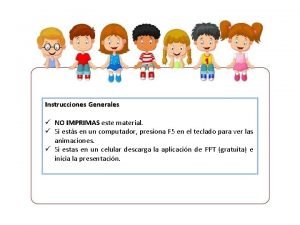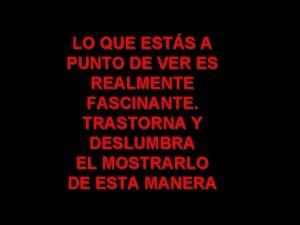Spanish 1 Ests triste Por qu Ests cansada











- Slides: 11

Spanish 1 ¿Estás triste? ¿Por qué?

¿Estás cansada o estás enferma?

Learning Outcomes: ¿Estás cansada o estás enferma? 9. 4. 1: Recognize coordinating conjunctions 9. 4. 2: Recognize the difference between porque and ¿por qué?

Introduction to ¿Estás cansada o estás enferma? • • Up to now we have been creating only the simplest sentences: one subject, one verb, one object. This is fine for simple situations, but what if you want to combine ideas into longer sentences? You’ll need a conjunction such as “and”, “or”, “but” or “because”!

Conjunciones coordinadas Coordinating conjuctions are the easiest way to join two simple sentences into one longer one. Usually when you use a coordinating conjunction no changes need to be made to the original simple sentences, though you may want to use pronouns to avoid repeating words. The four main coordinating conjunctions in Spanish are: y (and), o (or), pero (but), and porque (because). • Hablo el inglés. Comprendo el español. → Hablo el inglés y comprendo el español. • Por la tarde tomo una siesta. A veces doy un paseo. → Por la tarde tomo una siesta o a veces doy un paseo. • Mis hermanos son artísticos. Yo no dibujo bien. → Mis hermanos son artísticos pero yo no dibujo bien. • Estudio idiomas extranjeros. Los idiomas extranjeros abren oportunidades internacionales. → Estudio idiomas extranjeros porque abren oportunidades internacionales.

Porque vs. ¿por qué? These two words are frequently confused in Spanish because of their similarities in spelling and pronunciation, but they are really completely different words! Once you remember that all question words have accent marks in Spanish and the connecting words (conjunctions and relative pronouns) do not, then you should be able to tell these apart. Then you’ll just need to remember that the question is the one written as two words. • • ¿¿Por qué me haces esto? ? (Why are you doing this to me? ? ) Lo hago porque me preocupo por ti. (I do it because I worry about you. )

Ejercicios Fill in the blanks with the fitting coordinating conjunction. 1. 2. 3. 4. 5. 6. Mi amiga está triste ____ llora mucho. (ambos = both) Una persona resiliente acepta su situación ____ cambia sus circunstancias. (alternativa) Mi amiga llora mucho ____ tiene problemas con su novio. (razón = reason) Yo estoy nerviosa en los exámenes ____ me concentro en el material. (contraste) Yo estoy frustrada ____ no puedo resistir la tentación de los juegos en la computadora. (razón = reason) Mi amigo está contento en su trabajo ____ está un poco aburrido a veces. (excepción)

Actividad: ¿Estás triste or feliz? ¿Por qué? Con un compañero, decide tu emoción y explica por qué tienes esa emoción. • • • Recibes una mala nota en la clase de matemáticas. ¿Estás sorprendido o triste? ¿Por qué? Conduces un viaje largo de cinco horas. ¿Estás aburrido o contento? ¿Por qué? Tienes que hablar enfrente de la clase. ¿Estás nervioso o emocionado? ¿Por qué? El clima va a ser lluvioso por una semana ¿Estás deprimido o alegre? ¿Por qué? Son las cinco de la mañana. ¿Estás despierto o dormido? ¿Por qué?

Practice Question 1 Cuando no hay mucho trabajo, mi amigo lee el periódico ____ juega en la computadora. (alternativa) A. porque B. pero C. o D. y

Practice Question 2 Para cambiar mis malos hábitos, debo evitar malas influencias ____ debo comenzar nuevos hábitos buenos. (ambos = both) A. pero B. porque C. y D. o

Quick Review • What are coordinating conjunctions and how do we use them? • How are porque and por qué different?





















